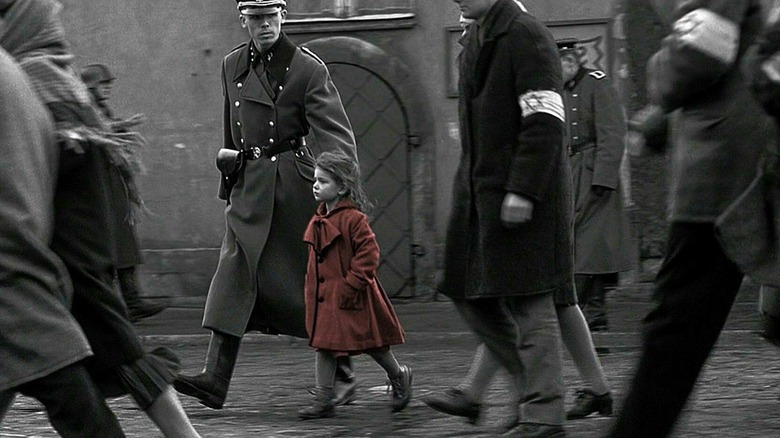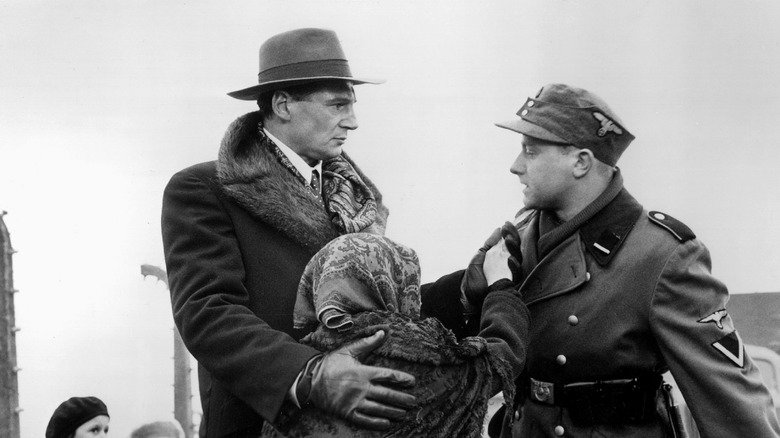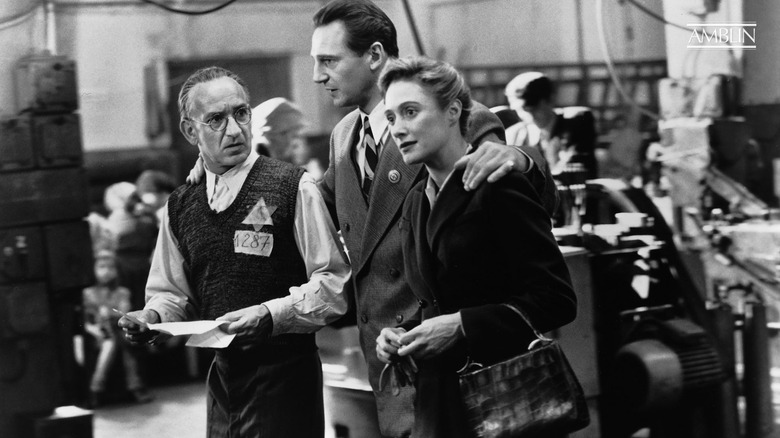It Was A Long And Winding Road Getting Schindler's List To The Big Screen
Schindler's Ark, the factory where German Nazi Party member, industrialist, and profiteer Oskar Schindler sheltered 1,200 Jews from extermination, is quietly falling into ruin. Situated around 30 miles north of Brno in the Czech Republic, the historic buildings nestle beside a bend in the Svitava river, arranged around a small square less than 50 meters across. Schindler's office, where he spent most nights so he could keep an eye on the guards, sits next to the SS barracks, which, in turn, neighbors the Jewish quarters.
I spent a day there helping a filmmaker friend capture some footage of an event celebrating the tentative return of textile production to the site, for the first time since it was seized by the Nazis at the beginning of World War II. The owners, the Jewish Loew-Beer family, fled to England for safety. Now over 80 years later, one of their descendants, Daniel Loew-Beer, plans to restore the buildings and create a Holocaust museum and visitor's center to help keep the memory alive.
I was shocked that such a key location in the story of Schindler's Jews has been allowed to fall into such disrepair, especially after the success and enduring legacy of Steven Spielberg's "Schindler's List." As World War II fades into history and the remaining survivors able to offer their testimony dwindle, visiting the site really made me realize what an important role education has in keeping the story of the Holocaust fresh in people's minds.
The educational aspect of adapting Thomas Keneally's novel, "Schindler's Ark," was at the front of Spielberg's mind when he decided to direct his film version, although it took a long while before he felt able to take that step.
The man who made Schindler's List happen
Spielberg was only a kid when Holocaust survivor Poldek Pfefferberg set out to bring Oskar Schindler to the big screen. He had opened a leather goods store in Beverley Hills in 1950 and used the choice location to tell the story to anyone who would listen in the movie industry. In 1951, he approached Fritz Lang to direct a film based on the subject, and the Austrian maestro of "Metropolis" and "M" would have made a capable and worthy choice; Lang himself had Jewish heritage and fled Germany in 1933 after Joseph Goebbels offered him a job. Unfortunately, his potential version didn't work out.
Pfefferberg persevered for another 30 years until one day in 1980 someone finally picked up the story. Australian author Thomas Keneally was in town and in the market for a new briefcase. After visiting Pfefferberg's shop, he not only came out with something to carry his papers in but also the raw material for a Booker Prize-winning novel. Pfefferberg was heavily involved, acting as Kenneally's advisor and traveling to Poland with him to visit important sites. Kenneally later dedicated the book to him.
"Schindler's Ark" was published in 1982. MCA President Sid Sheinberg first brought it to Spielberg's attention, who was on a hot streak after directing back-to-back Best Picture Oscar nominees, "Raiders of the Lost Ark" and "E.T. the Extra-Terrestrial." He displayed enough interest in the story for Universal to buy the rights, but there was a snag. Although Spielberg recognized how important it was to make a film about the subject, he didn't yet feel mature enough to helm the project himself.
Meanwhile, the indefatigable Mr. Pfefferberg stayed on the case, claiming he phoned Spielberg's office every week for 11 years about making the movie.
Spielberg almost gave Schindler's List to another director
Prepared to produce "Schindler's List" rather than direct, Spielberg offered the film to several well-known directors. Billy Wilder was someone with a personal interest having lost family members to the Nazis, as had Roman Polanski, whose mother was murdered in Auschwitz. Other names included Sydney Pollack and Brian DePalma, and Martin Scorsese was even attached to direct in the late '80s. Spielberg had misgivings about passing up the opportunity and the two directors later swapped projects; Scorsese took on "Cape Fear" while Spielberg felt urged to direct "Schindler" after seeing the rise of neo-Nazism and Holocaust denial in the wake of the Berlin Wall falling in 1989. He said (via Far Out):
"My primary purpose in making 'Schindler's List' was for education. The Holocaust had been treated as just a footnote in so many textbooks or not mentioned at all. Millions knew little if anything about it. Others tried to deny it happened at all."
It's hard to believe now, but major American films specifically about the Holocaust were few and far between before "Schindler's List." Spielberg had both the talent and the star name to bring the story to the widest possible audience.
Before he got the green light, Spielberg agreed to direct a dinosaur flick first. It was a good choice, as the double-whammy of "Jurassic Park" and "Schindler's List" made 1993 a huge year for the director both commercially and critically. The two films made a combined box office total of over $1 billion worldwide (via Box Office Mojo), and "Schindler's List" earned Spielberg Oscar wins for Best Picture and Best Director.
"Schindler's List" remains an incredibly powerful and important document almost 30 years later. It may have taken Spielberg a while to get the story to the screen, but he definitely did it right.


